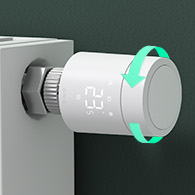The finger test is a simple way to find out if the pump is working properly without any special test equipment apart from the finger!
The pump head is removed but left wired up to the supply. At this point its important that an earth wire is connected to the pump and ideally it should be tested for continuity from pump body to earth.
The pump head is placed with the impeller upwards on a flat and firm surface.
Hold the pump body firmly with the left hand and switch on the power. The impeller should spin! Use the right index finger ( 2 ) to press down on the left hand side of the impeller which should be moving away from the end of the finger. By pressing down on the outside of the impeller it should be quite difficult to stop it moving. You will probably be able to stop the pump starting with the finger but again only by applying considerable pressure.
If the pump is spinning but can easily be stopped then its quite possible that the capacitor has lost some of its value and this can be measured to see how the value compares with the marked value which is often about 2.6 µF
Tony
The pump head is removed but left wired up to the supply. At this point its important that an earth wire is connected to the pump and ideally it should be tested for continuity from pump body to earth.
The pump head is placed with the impeller upwards on a flat and firm surface.
Hold the pump body firmly with the left hand and switch on the power. The impeller should spin! Use the right index finger ( 2 ) to press down on the left hand side of the impeller which should be moving away from the end of the finger. By pressing down on the outside of the impeller it should be quite difficult to stop it moving. You will probably be able to stop the pump starting with the finger but again only by applying considerable pressure.
If the pump is spinning but can easily be stopped then its quite possible that the capacitor has lost some of its value and this can be measured to see how the value compares with the marked value which is often about 2.6 µF
Tony


